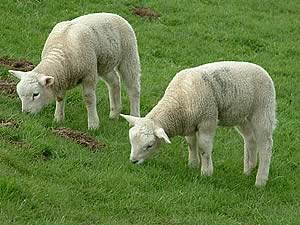2010-04-28
With lamb prices buoyant, sheep producers are being urged to realise full value for the 2010 crop by making sure finishing lambs on the farm are vaccinated against pasteurellosis and the main clostridial diseases.
2010 lambs will remain vulnerable to pasteurella and clostridial diseases unless they are vaccinated from three weeks of age.
 |
“Losing lambs to easily preventable diseases this summer really is throwing money away,” says Intervet/Schering-Plough Animal Health ruminant veterinary adviser Drew McGurren MRCVS.
He explains that the colostrum lambs receive from the ewe shortly after birth only gives them protection for a limited time against pasteurellosis and diseases like pulpy kidney, braxy, blackleg and tetanus.
“It’s true that if ewes are vaccinated properly with Heptavac-P Plus in the run up to lambing then the lambs will also gain immunity. But this so called passive immunity only lasts for so long. Lambs that receive a good intake of colostrum only have antibodies against pasteurella for up to 3-4 weeks and clostridia for up to 12 weeks. This means that some early season lambs are now unprotected and at real risk from these prevalent disease threats unless they are vaccinated themselves.”
Drew McGurren recommends vaccinating finishing lambs with Ovivac-P Plus, pointing out that the cost of one severe outbreak of pasteurellosis equates to around 50 years of vaccine use for the average flock.
“In the last 12 months, 2.8 million lambs have been vaccinated with Ovivac-P Plus as more farmers appreciate the importance of protecting these valuable animals. The vaccine can be used from three weeks of age and the primary course involves two vaccinations 4-6 weeks apart. An annual booster can be given thereafter, but most lambs are slaughtered before then or start on Heptavac-P Plus instead if they are to be kept as breeding animals.”
 Bird Flu Continues to Pose a Global Threat Bird Flu Continues to Pose a Global Threat
 Public Attention Shifting from Avian Influenza Public Attention Shifting from Avian Influenza
 Fort Dodge Awarded EU Licence for Zulvac 8 Bluetongue Vaccine Fort Dodge Awarded EU Licence for Zulvac 8 Bluetongue Vaccine
|



